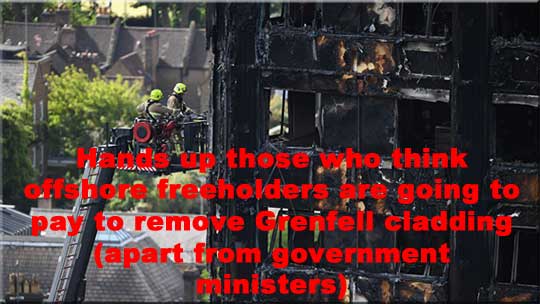 – Government should retrospectively ensure leaseholders are a legal party to insurance and warranties
– Government should retrospectively ensure leaseholders are a legal party to insurance and warranties
– Identify offshore freeholders demanding huge sums of money, MP demands
– Get freeholders in front of Communities Select Committee
– Waive VAT on cladding replacement costs, says Bottomley
– Steve Reed MP: ‘No other country in the European Union permits a system this lax’
– British Research Establishment ‘has a financial interest in permitting the use of combustible materials that it then tests’
– National House Building Council ‘makes money by signing off flammable cladding’
– £80,000 bills for fire watch at 57-flat Northpoint, in Bromley
– £40,000 each for leaseholders at Sesame Apartments, Battersea, completed in 2014
– Huge bills for leaseholders at 121-flat Premier House, completed two years ago
– What will giving YET MORE money to the Leasehold Advisory Service achieve?
– New Capital Quay leaseholders, in Greenwich, in limbo as Galliard and National House Building Council fight it out
– Glasgow Harbour also has cladding, but no ‘feudal leasehold landlordism’ to make things worse
– Government response? We hope freeholders will pay up, and we give more money to the Leasehold Advisory Service
Full debate:
Fire Safety and Cladding
Hansard (the Official Report) is the edited verbatim report of proceedings of both the House of Commons and the House of Lords. Daily Debates from Hansard are published on this website the next working day.

The dire predicament of leaseholders in blocks with Grenfell style cladding was debated in Parliament yesterday as successive MPs reported the woes faced in their constituencies.
Louise Ellman (Labour, Liverpool Riverside) raised the issue of Heysmoor Heights, where the freeholders hide behind the anonymity of a Guernsey company, Abacus Land 4 Limited, and are managed by William Waldorf Astor’s Long Harbour group.
Unaffluent leaseholders face bills of £18,000 each to remove the cladding despite Communities Secretary Said Javid urging freeholders not to pass on costs to the leaseholders.
Miss Ellman said: “That is simply not happening. At Heysmoor Heights, leaseholders of modest means are being asked to find £18,000 each, and the fact that payment plans are being discussed does not make any difference to that essential figure.
“That is a bill for £18,000 to keep people safe in a situation that they could not possibly have anticipated.”
Sir Peter Bottomley (Conservative, Worthing West), who is a patron of LKP, got to the point of the issue when he said:
“Is that situation not an illustration of the terrible leaseholder landlordism, which treats leaseholders as tenants when it is convenient for the landlord and as property owners when it is not?”
The enormous bills to remove Grenfell cladding and pay for fire marshals gets to the core of leasehold’s inherent unfairness.
The speculators who hoover up ground rents have been peddling the fiction for years that they are the long term custodians of communal buildings such as flats.
But when it comes to paying out, they do nothing at all: they are simply parasitical rentiers who gather the income streams which so egregiously erode the wealth of often poorer “homeowners”.
Sir Peter suggested that government waive VAT on the cost of removing cladding, which would cut the bills by 20 per cent.
“The second point is that leaseholders, apparently, do not have a right to get in touch with anybody legally about these issues; they are not party to the insurance or to the building and they are not written in anywhere. I ask the Government to find some way of deeming that leaseholders do have an interest, and retrospectively have had an interest, in the people who put up these blocks and the people who run them.
“I have a third suggestion – many of my suggestions come from the Leasehold Knowledge Partnership, which has already been mentioned by the hon. Member for Poplar and Limehouse (Jim Fitzpatrick) – It is that every freeholder of every block affected should declare who they are and how they can be contacted.”
“There must be no more hiding behind offshore entities. The managing agents should make sure they declare who these people are. Let us have them in front of Select Committees talking about who they are and how they will respond to this issue.”
Jim Fitzpatrick told the debate: “… the Government are clear that they want landlords to pay, as they have repeatedly exhorted them to. In the social sector, with registered social landlords and local authorities, they have been largely successful, but in the private sector the opposite is true. Many freeholders and property management companies take the view opposite to the Government’s. As the Leasehold Knowledge Partnership has reported to my hon. Friend, it is leaseholders who are picking up the tab.
“One thing is for sure: leaseholders have no blame in this.”
The debate was called by Steve Reed (Labour, Croydon North), who championed the cause of the leaseholders at Citiscape, where the freehold is owned by the Tchenguiz Family Trust, based in the British Virgin Islands, and FirstPort is embedded in the tripartite lease.
Mr Tchenguiz’s senior executive, William Kenneth Procter, is referenced in the Panama Papers here:
Procter William Kenneth
Panama Papers Officer: Procter William Kenneth
The cladding issue at Citiscape went to tribunal last month, and we anticipate a ruling around March 16.
Mr Reed told Parliament: “The residents were told that it would cost them as leaseholders up to £31,000 per flat to remove the cladding—a bill many of them simply could not afford—and that if everybody did not pay, none of the work would start. One older resident had to cancel his move to a care home because the flat he was going to sell to pay for that move was unsellable because of the cladding on the building. These people are stuck in a building that they describe as a deathtrap, unable to move and unable to afford the cost of making their homes safe.”
Mr Reed made fulsome criticism of the British Research Establishment in Watford and the National , which in spite of their official sounding names are for-profit companies that tests building materials or sign them off as safe:
“The BRE makes up to £40,000 per test that it conducts for manufacturers. As it also drafts the guidance, as an organisation it has a financial interest in permitting the use of combustible materials that it then tests.
“The fire safety tests after Grenfell were carried out by Kingspan, which manufactured part of the materials on Grenfell in the first place. Some individuals from the BRE who drafted the Government’s flawed guidance are now advising Ministers that there is not a problem with the regulations that they drafted.
“What a surprise!
“It is even possible to bypass safety tests completely by paying somebody to carry out a desktop study, which does not involve doing any testing whatever.
“The privatised National House Building Council makes money by signing off flammable cladding that has never been tested, and because flammable materials—combustible materials—are cheaper to make, the industry has a perverse incentive to keep costs down by using combustible cladding.
“No other country in the European Union permits a system this lax.”
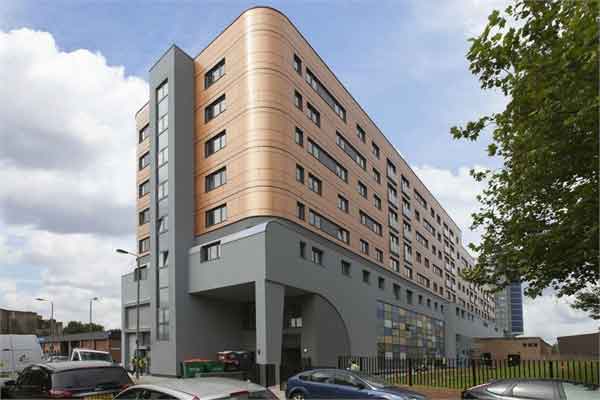
Robert Neil (Conservative, Bromley and Chiselhurst) raised the case of 57-flat Northpoint, in Bromley, which was converted from offices 15 years ago.
“The leaseholders have spent some £80,000 on a two-man, 24-hour “waking watch” on the premises, and if the building has to be re-clad, the costs are likely to be in the hundreds of thousands. They are in a difficult situation, because the developer’s 10-year guarantee is out of date and the freeholder is a commercial company …
“… the flats are unsaleable because no one will buy them in the circumstances. Many of the residents are young professionals; I received a letter from one constituent whose flat was the first home that she and her husband were able to buy. They have no chance of moving on—they are stuck with an asset that has turned into a liability.”
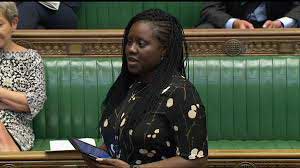
Marsha De Cordova (Labour, Battersea) dismissed the Communities Secretary’s call for freeholders to pay for cladding removal, and the additional funding to the controversial, taxpayer-funded Leasehold Advisory Service (LEASE).
LKP is unaware of any initiative by LEASE over the cladding issues, and it has only suggested today that it meet the Citiscape leaseholders.
Miss De Cordova referenced Sesame Apartments, which was only completed in 2014, where leaseholders face bills of £40,000 each.
Wandsworth council is also retrofitting sprinklers to blocks off 10 storeys or higher with the costs passed to private leaseholders.
“The Government cannot go on simply applying gentle pressure on freeholders and talking about learning the lessons of Grenfell. Nearly a year has passed. Residents deserve to live in safe buildings and we need to find a way of protecting leaseholders from being hit by life-shattering bills.”
Luke Pollard (Labour, Devonport) referenced Mount Wise in Devonport, a site of three blocks with combustible cladding (Lynher House, Tavy House and Tamar House).
Dr Matthew Offord (Conservative, Hendon) referenced Premier House, which was converted from commercial to residential with 121 flats two years ago.
“I was shocked to find that at the beginning of January this year the people who had just moved into those properties were told that the service charge in the block had doubled from £2,200 a year to £4,200 a year because the cladding has to be removed, just two years after the property was converted.
“In addition, the managing company is also hiring four fire marshals to patrol that building constantly. That is causing my constituents huge concern. Many are self-employed or have only just got a mortgage. Some are one-parent families and are struggling to keep up with their payments. A lot of them have formed an action group and want to take the matter to a first-tier tribunal.”
Sarah Jones (Labour, Croydon Central) referenced a block of flats in her constituency where both the freeholder, Wallace Estates, and the developer Durkin, have “washed their hands” of responsibility.
She added: “The Government should look at ownership rules for property. As the hon. Member for Worthing West (Sir Peter Bottomley) said, there should be no more hiding behind offshore entities.
“One of the problems that we have had is working out who owns buildings and freeholds. There are shell companies and offshore companies that are impenetrable. Details cannot be obtained from the website. It is complicated to get through to them.
“The Prime Minister yesterday addressed the issue of land banking, opening up the possibility that developers who sit on land might face restrictions in getting planning permissions. Will the Minister take a similar approach to developers, stopping planning permission being given to them if they sit on their hands and leave dangerous cladding in place?
“The buck stops with the Government. If they believe that other people are responsible, they have to make sure action is taken. My constituents, who are the least able to pay and the least to blame, are in the firing line. The Minister must surely accept that that is not fair.”
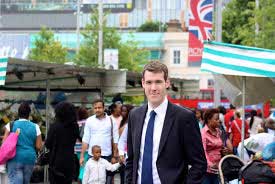
Matthew Pennycook (Labour, Greenwich and Woolwich) said: “Two hundred and sixty-four days have now passed since we watched flames engulf the Grenfell tower block in north Kensington, yet on private freehold developments across the country hundreds of thousands of residents still live with the knowledge that their homes are covered in lethal material.
“New Capital Quay, a vast 980-home development in my constituency, is one of hundreds of such cases, although it is perhaps the highest-profile.
“Residents are left in limbo while the freeholder, Galliard Homes, and the National House Building Council tussle over whether there was a breach of building regulations at the time of construction, and about who is liable—this tussle might be settled out of court, but it might ultimately be resolved only through lengthy litigation.”
“… What has been the Government’s position throughout? It has amounted to little more than a muffled and infrequent plea to the private companies involved not to pass on costs to leaseholders.
“No attempt has been made to ensure that the dangerous cladding is removed as a matter of urgency. In many ways, however, that is no surprise because the Government are deeply compromised on fire safety. In 2013, they failed to act on recommendations made after the 2009 Lakanal House disaster, and they chose not to rewrite procedural guidance set out in Approved Document B. They did nothing to prevent the installation of combustible polyethylene ACM cladding of the type found on New Capital Quay.”
Martyn Day (Scottish National Party, Linlithgow and East Falkirk) said that the whole issue of who pays to remove Grenfell cladding is not an issue in Scotland:
“That is not so much an issue in Scotland because the Abolition of Feudal Tenure etc (Scotland) Act 2000 and the Tenements (Scotland) Act 2004 effectively brought the last vestiges of leasehold to an end. However, the problem of owners being financially trapped in buildings affected by these issues does apply, and that has been further complicated by changes over the years to building regulations.”
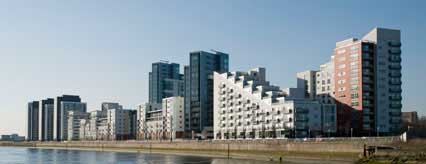
Scottish flat owners are in a far clearer position than English ones and can take legal action directly against developers or warranty issuers or the government. In England, the freeholder would have to do this on behalf of the leaseholders.
And where is the profit in that?
Carol Monaghan (Scottish National Party, Glasgow North West) cited Glasgow Harbour flats as an example of a site with combustible cladding, where the homeowners – who are real homeowners as opposed to being leasehold tenants – face enormous bills.
Dominic Raab, the Housing Minister, responded to the debate for the government.
He mentioned the 2009 fire at Lakanal House, in Camberwell, south London, raised by Steve Reed and Matthew Pennycook, and said:
“… it is right to point out that the shadow Housing Minister, the right hon. Member for Wentworth and Dearne (John Healey), refused extra funding for fire safety measures when he was the Housing Minister, because he did not deem them necessary.
“I am not saying that to score political points … ”
“Why would you say it, then?” asked Marsha De Cordova.
Mr Raab then repeated the hope of Communities Secretary Sajid Javid that freeholders do not dump the cost on leaseholders.
“In the private sector, of course, the allocation of responsibility depends on the terms of the leasehold arrangements, as qualified by general law. The determination of the legal position will obviously need to be settled ultimately by a court.
“Proceedings are under way in the constituency of the hon. Member for Croydon North, as I am sure he knows. I took the point that my hon. Friend the Member for Hendon (Dr Offord) made: that it cannot be right for a Minister to pre-empt or prejudge the legal determination of a relationship, where it is not only spelled out in the leasehold arrangement, but qualified by general law.
“In some cases, the costs fall, in practice, to landlords or building owners; it may be clearer in some leases than in others. Where the costs do not fall to landlords or building owners as a matter of strict law, we continue to urge those with responsibility to follow the lead of the social sector.
“We urge those private companies to do the right thing, and not to attempt to pass the costs on to residents.”
LKP believes this hope to be optimistic, and that there is very little prospect of freeholders coughing up – especially the anonymous offshore ones.
The only site that LKP is aware of where the freeholder has undertaken to pay a £10 million bill for fire marshals and cladding removal is Legal and General at the Blenheim Centre / Reflexion in Hounslow.
There are two reasons for this:
1/ The insurance giant owns the shopping centre below and was in for a bill in any case.
2/ Legal and General, unlike most players in the leasehold game, has a reputation worth preserving.
Mr Reed concluded the debate that he called with the words:
“The industry is still very confused about what it needs to do when this kind of cladding is found on buildings. The Department needs to issue clearer advice.
“Finally, we bailed out the banks when they broke the banking system. Why can we not bail out leaseholders, who are innocent victims of the Government’s failed, flawed fire safety regime?”





 Labour deputy Tom Watson joins APPG on leasehold reform – but select committee STILL won’t call in the housebuilders
Labour deputy Tom Watson joins APPG on leasehold reform – but select committee STILL won’t call in the housebuilders






















Stopped reading after a few paragraphs. Fine speeches are like farts in the wind in Parliament. Moral indignation is laughed out of court.
Parliament knows what law it created, no?
If Government wanted reform it could start by enacting the sleeping clauses already in the 2002 act that gave modest transparency rights to leaseholders.
How would Commonhold rectify any of this ? There would be no Freeholder to blame , and unit holders would for sure have to fork out the costs in such circumstances.
The issue here has nothing to do with leasehold. The issue is incompetence of planning regulations. Those who authorised the construction of such buildings should be the ones responsible to pick up the tab.
Perhaps you missed this bit:
It is a bit like insurance: leaseholders pay to insure a building but, because they are not a legal party to the contract, cannot see how much the freeholder is skimming off in what is politely termed commission.
The cladding scandal shows just how pointless and over-complex this form of tenure is.
From what I have seen all building warranties on flats Igive leaseholder the warranty as well. One can claim for such issues. Although no doubt cladding would be excluded as it was approved by local authority. My position is clear,neither freeholder or leaseholder are at fault here it’s the people who rubber stamped and allowed this type of material to pass who should be liable.
If that does not happen then under Commonhold the unit holders pay and under leasehold it depends what the lease says and how its interperted. If the leaseholders won the case at Tribunal and Freeholder has to pay ( I highly doubt will be the case ) then it would demonstrate that fiat owners are better protected by leasehold. Surely this is the opposite of what you are campaigning for.
I think Interested is talking balderdash and to my mind is probably a Freeholder or has a business partner who is in the business. Warranties Swarannties do not amount to a hill of beans. Is interested in the Freehold business. “ Better protected by Leasehold” What a shyster. Interested would be out of a job if commonhold came the norm. Who is her or his paymaster.
I completely agree with your comments
Who are you “ Interested” ?. I have never given my voice on this forum before but have avidly read what people had to say about the Leasehold situation.
I do recall a poster name Interested waxing lyrical about the joys of Forfeiture. Was that you ? Are you a Managing Agent? Freeholder.? Speculator? Please make yourself known. Others give their names on this site. Why are you hiding behind your hand.Who are you?
Interested,
That you believe Commonhold would rectify any of these is presumably on the basis that as “commonholders” they own the building therefore are responsible for any costs to rectify the defective cladding.. That being the case does that not mean that it must be the freeholder that is responsible for the cladding and not the leaseholder?
The issue then becomes one of “can the freeholder claim the costs against leaseholder service charge accounts? Is the replacement of dangerous cladding an improvement or part of maintenance?
It would be of interest to find out what the expected lifespan of the cladding was supposed to be?
Hi Interested:
“From what I have seen”…
Interesting assertion re warranties. Never having owned a new build leasehold myself, can you point to evidence you have that new build structural warranties expressly protect a leaseholder for the non-demised parts of the premises?
Have looked at provider FAQs on line and have missed finding the word “leasehold” but this doesn’t mean it isn’t there. Instead I see mention of ‘home owner’. A lessee does not ‘own’ the retained parts and doesn’t actually ‘own’ the flat either, no?
‘Home owner’ can be an interesting legal term in long leasehold?
I know landlord building insurance should include “Mortgage and Other Interests” to include lessees’ interests. Lessees should have direct access to the insurer to claim, but getting the schedule or policy details can be problematic. Landlords/agents can charge commission to ‘deal’ with claims between a lessee and the insurer. Doesn’t this put the lessee at the ‘mercy’ of the landlord/agent if a warranty applies?
Are you saying not?
Amazing how if you don’t tow the “party line” on here and agree with everyone to be jolly yiuvare immediately accused of being a Freeholder or agent. An alternative view is not tolerated by communists only.
I have made my points clear sorry for spoiling your one sided party.
I will say no more and allow you to continue compliment each other and share your one sided views.
Interested. I am sure your views are tolerated. But please show your hand, Are you a Managing Agent, Freeholder. Speculator or a business partner of a property speculator. Why hide behind your hand. What is your name?
What is a “ yiuvare”? Very curious. I too will say no more as I very rarely if ever comment is on social media although I do read comments. I just felt compelled to respond to your comment and say that I believe that the Freeholders are solely responsible for the replacement cladding.
Leaseholders should not be held accountable for any costs. It should be for the Freeholder, developer and insurers to slug it out.
I
Everyone is entitled to an opinion, yet your opinion makes no common sense…you wish to allow freeholders the benefit of the collection of ground rents, large bonuses for lease extensions (ground rent advances, marriage value), yet FREEHOLDERS do not provide a service OR product, for such monies AND TRY TO PASS ON ALL RESPONSIBILITIES TO EVERYONE ELSE! People receive prison sentences for less AND YET YOU CANNOT COMPREHEND WHY LEASEHOLDERS AND EVERYONE ELSE ARE SO INFLAMMED BY THE INJUSTICE?? Freeholders cannot have their cake and eat it….there is more responsibility and legislation on landlords (with their tenants), than freeholders are required to maintain, with leaseholders – which is wrong!
Interested,
This and other sites benefit from having views expressed,however seemingly controversial they may appear to be?
I place your comments in this category.
As someone who over the years has regularly been shot down in flames (sometimes I concede justifiably!) I never walk away. I either fight my corner if not persuaded by contrary views or I acknowledge my error, learn from it and move on.
You don’t. You find an excuse (however tenuous) to avoid challenge.
So it is not your views. that I have problems with? Indeed an alternative view is only positive. I have no problem if you are a freeholder or managing agent either?
My problem(and I feel others share my concerns) is that like one or two others who have posted similar comments when challenged you make your excuses and run for the hills.
If you genuinely believe what you post (even if you have an undeclared vested interest) my message to you is “Grow a Pair” and stand your corner..
Thankfully the subject of leasehold/commonhold is now in the hands of appropriate authority.and we can look forward to the Law Commission report on both shortly. And thence to the enactment of long overdue reform legislation.
It is only those of “Interested”, type who desperately seek to continue clinging to their own ill gotten carpetbagging purse strings
On the subject of cladding, I am reminded of the 2005 Fire Safety “guidelines” which created an industry promoting wholly unnecessary “upgrading” works. Unsolicited Fire Risk Assessments from out of the woodwork “consultants” became the order of the day, recommending, for example, that perfectly sound and superior communal corridor doors be ripped out and replaced at fraudulent cost What else took place on the backs of some of these FRA’s ? I trust the Enquiry will look into the refurbishment history of Grenfell.